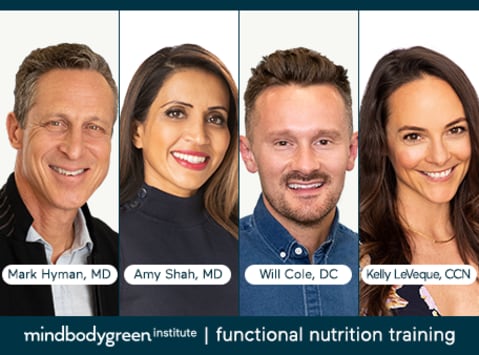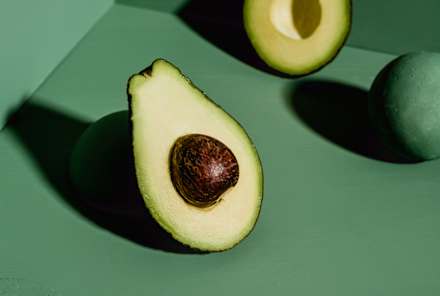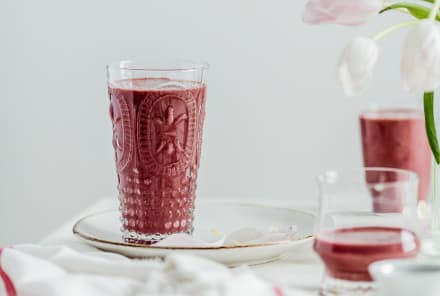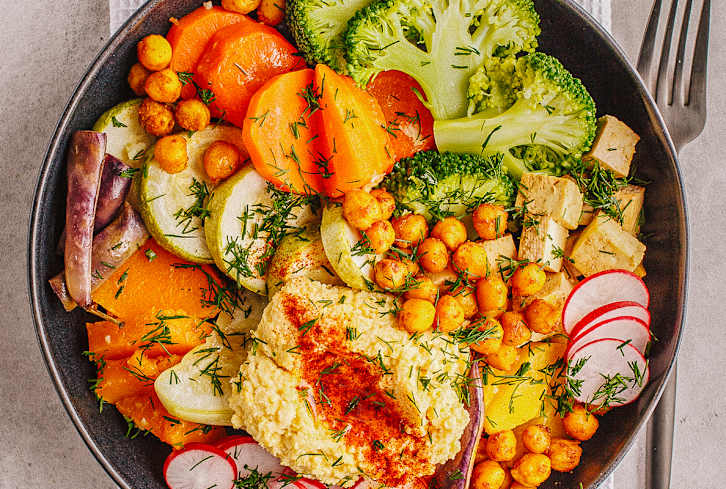Advertisement
The Perfect Post-Workout Meal To Help You Build & Maintain Lean Muscle

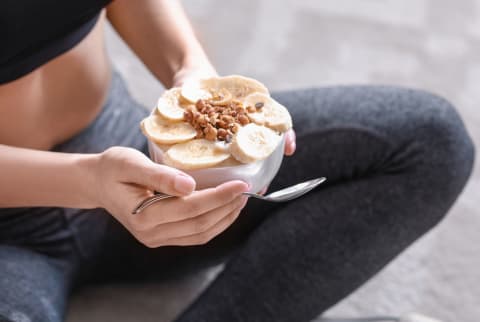
After a good sweat, you're bound to ask yourself: What should I eat to ensure I'm supporting the work I just did? After all, your post-exercise diet significantly influences muscle-building and recovery. Selecting the right foods is crucial for maximizing progress.
Which leaves us with the following questions:
- What is the very best thing to eat after a workout?
- When exactly should it be eaten (10 minutes? an hour? three hours?)?
- Do the recommendations differ based on what type of exercise you do?
To get answers, we spoke to top nutrition and fitness experts looking through the lens of building and maintaining lean muscle mass, which is essential for longevity.
The importance of post-workout fuel
Whether you've just wrapped up a cardio, strength training, or high-intensity training session, eating after a workout is critical for muscle protein synthesis (MPS)1—the driving force behind muscle growth.
MPS promotes muscle growth by helping put your body in an anabolic state in which the rate of MPS exceeds the rate of muscle protein breakdown2.
Exercise stimulates both the growth and breakdown of muscle tissue3. Eating after a workout helps fuel your body to build muscle (anabolism) while preventing muscle breakdown (catabolism).
"Eating after working out encourages the body to create an anabolic environment and supports muscle growth, as it provides your muscles with the nutrients required to repair themselves," Erin Palinski-Wade, R.D., CDE, a registered dietitian and author of 2-Day Diabetes Diet, tells mindbodygreen.
Summary
Does the type of workout matter?
Eating high-quality carbohydrates and healthy protein sources after training is crucial for building muscle. However, the ratio of these macronutrients will vary depending on the type of workout you just performed.
For example, after an endurance (aerobic) workout such as running or cycling, research shows you should aim for a roughly 3:1 carb-to-protein ratio4. This is because cardio workouts expend more energy (calories) but break down less muscle tissue than strength training.
Conversely, you can adjust this ratio to 2:1 carbs to protein after completing a strength-training session. While lifting weights doesn't burn as many calories as running, it breaks down more muscle tissue, meaning amino acids (the building blocks of protein) are required for MPS and muscle growth2 post-workout.
Summary
The importance of protein
Consuming protein after a workout is essential to support muscle growth and repair.
For a quick refresher, protein is made up of 20 amino acids5, nine of which are essential (meaning you need to obtain them through diet because they're not produced in the body).
Specifically, the branched-chain amino acids (BCAAs) leucine, isoleucine, and valine are important for muscle growth because they're broken down in your muscle tissue2 instead of the liver like other essential amino acids.
Among the three BCAAs, leucine plays a significant role in MPS. "Leucine is essential for building muscle and has been referred to as an 'anabolic trigger' because of its ability to switch on MPS," explains Palinski-Wade. "This makes it a crucial component of post-workout protein shakes or meals."
Research indicates that consuming adequate amounts of leucine after a workout (around 2.5 to 3 grams) can significantly enhance MPS and promote muscle growth6. Leucine works best when combined with the other BCAAs, and it also activates mTOR, a pathway that stimulates protein synthesis7.
So, how much protein should you eat to build muscle? "If you're worried about general health, you should be above 100 [grams per day]," Don Layman, Ph.D., a leading protein and amino acid researcher and professor at the University of Illinois at Urbana-Champaign, previously told mindbodygreen. However, "If you're an athlete that weighs 200+ pounds, you're probably going to want to be in the 160 [gram] range," he adds.
Per meal, Ben Schermerhorn, CPT, a master personal trainer, explains, "Current literature has found that eating 1.6 to 2.2 grams8 of protein for every kilogram of body weight divided over four meals each day best supports muscle building. So aim to consume 24 grams of protein per meal for a 130-pound woman or 32 grams of protein per meal for a 175-pound man at each meal."
Summary
What if you're a vegetarian?
Plant protein has less of an anabolic effect9 than animal protein on average, but nevertheless, all plants contain amino acids and are beneficial for muscle growth. Plus, plant protein sources contain other essential nutrients, such as fiber, vitamins, and minerals, that are excellent for overall health and support muscle growth.
"Vegans and vegetarians can meet protein goals by eating plants alone," says Palinski-Wade. "However, because plants often contain less protein than animal sources, it's important to balance a vegetarian diet to ensure adequate protein is consumed. Beans, legumes, quinoa, nuts, and seeds can all be great plant-based ways to boost protein."
As far as leucine in plant versus animal products is concerned, Layman previously gave this example: "In whey protein, leucine is about 12%, so 23 grams of whey protein isolate will trigger it. Whereas in soy protein isolate, it's about 7.8%, so now you need 33 or 34 grams." This means that plant-based eaters may need to eat more total protein (and more total calories) to reach that all-important leucine threshold for muscle growth.
While we are huge fans of veggies, eating enough protein on a plant-based diet can be tricky. It's doable, but it takes more effort, more calories, and more planning.
What else should I be getting?
Besides protein, there are plenty of other nutrients that are important to consume post-workout. For example, carbs can enhance performance10 in both endurance and strength training. Also, the complex carbs in whole grains, legumes, fruits, and vegetables provide your body with the energy required to perform during exercise.
Another macronutrient you shouldn't neglect after working out is fat. Healthy monounsaturated and polyunsaturated fats increase HDL "good" cholesterol levels, which can increase growth hormone production 11and create more amino acids for building muscle tissue.
Staying hydrated and maintaining electrolyte balance (e.g., sodium, potassium, chloride, magnesium) are also important post-workout. Since water makes up approximately 76% of your muscle mass12, it makes sense that you'd need plenty of this fluid for proper muscle function. In addition, when recovering after an intense workout, it's vital to replenish electrolytes for repair and hydration.
For example, electrolytes such as calcium are essential for helping build tissue13. Additionally, sodium helps maintain proper water balance14 inside and outside your body's cells.
Getting enough calories is another critical component of muscle growth. "To gain muscle, you need adequate calories to support growth. So, make sure you're meeting your calorie needs daily along with your protein needs to promote muscle gains," says Palinski-Wade.
Summary
Does timing matter?
For years, research has indicated that you need to eat within your anabolic window15 of 30 to 120 minutes after a workout to optimize muscle growth and repair. However, recent studies16 have concluded that consuming 25 to 30 grams of high-quality protein in meals throughout the day is what's important for building muscle.
Therefore, as long as you spread enough daily protein across three or four meals a day, meal timing does not matter as much and you don't have to worry about cramming in food right after a workout.
The one caveat is if you like to exercise at night since eating too close to bedtime can make it more difficult to fall asleep. "If working out in the evening, plan to allow for two hours post-workout refuel to digest before bed when possible," Palinski-Wade advises. "If that's not an option, refuel with liquid protein and carbs such as a protein shake to promote quicker digestion and prevent it from impacting your sleep."
Foods to eat
Excellent protein sources to consume after exercise include legumes, soy-based foods, oats, quinoa, seitan, nuts, seeds, eggs, and lean meat. Focus on high-quality carbs to restore depleted glycogen (energy) stores, such as whole grains, fruits, and vegetables. Here's a post-workout grocery list for quick reference:
- Eggs and lean meats: Animal proteins have high leucine content that spurs MPS. When shopping for them, opt for regenerative-raised options when possible.
- Fish and seafood: Fish like salmon, sardines, and tune (among others) are fantastic sources of protein. Plus, you get additional omega-3s.
- Brown rice and beans: Combining rice and beans post-workout is a good idea since rice is low in the amino acid lysine17, while beans are rich in it. Conversely, beans don't have high amounts of the amino acid methionine, while rice does.
- Peanut butter on whole wheat toast: Peanut butter lacks methionine, but whole wheat bread has it. Whole wheat bread is low in lysine and threonine, while peanut butter has plenty.
- Legumes: Lentils, peas, chickpeas, and beans can all be great post-workout fuels.
- Whole grains: Think brown or wild rice, oats, barley, and buckwheat.
- Soy-based foods: Tofu, tempeh, and edamame are all examples of complete plant proteins.
- Nuts and seeds: Walnuts, almonds, cashews, Brazil nuts, pistachios, and hazelnuts pack a nutritional punch.
Foods to avoid
These foods won't do you (or your muscles) any favors post-workout:
- Added sugars: Sugary sodas, breakfast cereals, cakes, pastries, ice cream, milkshakes
- Saturated fat: Red meat, full-fat dairy
- Refined grains: White flour, white bread, white rice
- Ultra-processed ingredients: Processed meats and prepackaged frozen meals
Frequently Asked Questions
What is the best thing to eat after a workout to lose weight and gain muscle?
For inspiration, look to the list of healthy proteins, carbs, and fats shared above. You also can't go wrong with a smoothie or smoothie bowl. They're a fantastic way to get plenty of calories and nutrition.
In a high-powered blender, add liquid (e.g. water, milk, kefir, etc.) berries, banana, greens (e.g., kale, spinach), flaxseed, chia seeds, frozen cauliflower, a tablespoon of nut butter, a few scoops of grass-fed whey protein, and you're good to go.
How much protein should I eat after a workout to build muscle?
The exact amount you need will vary depending on your age, gender, size, and activity level. However, aim to get at least 25 to 30 grams of protein after your workout to stimulate MPS and optimize muscle growth.
"If you consume a good dose of protein at regular intervals throughout the day, there's no need to perfectly time your intake immediately before or after your training," says Schermerhorn. "While more research is needed, the data currently suggests that the anabolic window is more like an anabolic barn door."
Should you eat before or after a workout to build muscle?
While you should spread your protein intake throughout the day, getting some in both before and after your workouts is important. "As long as you eat some protein in a reasonable time before or after, you should be able to build muscle," says Schermerhorn.
"Eating a combination of lean protein and carbs before exercise can promote balanced energy during a workout, while post-workout, protein is king," Palinski-Wade adds.
The takeaway
Eating high-quality protein and complex carbohydrates before and after workouts is a recipe for success in reaching your muscle-building goals. Include various whole food sources of protein at each meal to ensure you get enough protein throughout the day to stimulate muscle protein synthesis and promote muscle growth. Curious if you're getting enough protein? Here are the signs you might have a deficiency.
17 Sources
- https://pubmed.ncbi.nlm.nih.gov/34697259/
- https://www.ncbi.nlm.nih.gov/pmc/articles/PMC5568273/
- https://www.ncbi.nlm.nih.gov/pmc/articles/PMC3354005/
- https://www.ncbi.nlm.nih.gov/pmc/articles/PMC7284704/
- https://www.ncbi.nlm.nih.gov/books/NBK234922/
- https://pubmed.ncbi.nlm.nih.gov/25926513/
- https://www.ncbi.nlm.nih.gov/pmc/articles/PMC5650960/
- https://pubmed.ncbi.nlm.nih.gov/29497353/
- https://www.ncbi.nlm.nih.gov/pmc/articles/PMC6723444/
- https://www.ncbi.nlm.nih.gov/pmc/articles/PMC8878406/
- https://pubmed.ncbi.nlm.nih.gov/8501145/
- https://www.ncbi.nlm.nih.gov/pmc/articles/PMC6723611/
- https://www.ncbi.nlm.nih.gov/books/NBK507850/
- https://www.ncbi.nlm.nih.gov/books/NBK557609/
- https://www.ncbi.nlm.nih.gov/pmc/articles/PMC3577439/
- https://www.ncbi.nlm.nih.gov/pmc/articles/PMC6142015/
- https://www.ncbi.nlm.nih.gov/pmc/articles/PMC6245118/
